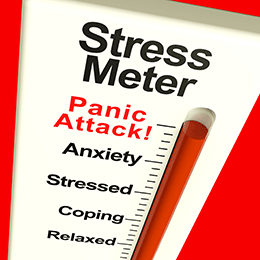Stress-free living is like a dream in today’s life, as stress is inevitable in our daily lives, and its impact on our well-being cannot be overstated. The everyday life of demanding work schedules, financial pressures, personal relationships, and health concerns, stress can affect us in numerous ways.
Research-based evidence has shown that stress can have short-term and long-term consequences on physical, mental, and emotional health. So Understanding the impact of stress on our daily lives is crucial. It will help to manage and mitigate its effects effectively.

In this introduction, we will explore the various ways to identify stress triggers in your life, supported by research findings, and highlight the importance of addressing and managing them to lead a stress-free life.
In today’s fast-paced world, it is important to identify the root cause of stress. Whether it is work-related pressure, personal obligations, or even just the constant bombardment of information from social media and news outlets. Stress can take a toll on our physical and mental well-being.
That’s why we’ve compiled a list of 10 ultimate ways to achieve stress-free living – tips, and tricks to help you find balance in your busy life. From mindfulness practices to time management strategies, these techniques have been proven effective by experts in the field.
So if you’re ready to reclaim your peace of mind and a stress-free living is all you want, keep reading!
How to lead a stressfree living-
Table of Contents
1. Identify the Triggers of Stress-

It’s important to identify what triggers stress to manage it effectively. Here are some common stress triggers that you may relate to:
- Work or school deadlines
- Financial problems
- Relationship issues
- Health concerns
- Major life changes (moving, starting a new job, etc.)
- Traffic or long commutes
- Family responsibilities
- Social pressures or conflicts
Of course, everyone’s stress triggers are unique to their own experiences and circumstances. By identifying your stress triggers, you can work towards developing coping mechanisms and finding ways to reduce or eliminate them. Stress-free living is a process, it will take some time for you to understand and develop the right ways to deal with it.
2. How Often do you experience Stress?

Once you understand the triggers of your stress, you can adapt to various ways to manage it. Here are some additional thoughts to consider. Recognize when you are experiencing stress and take steps to manage it.
- Physical changes: headaches, muscle tension, fatigue, digestive issues, changes in appetite or sleep patterns, and frequent illnesses or infections.
- Emotional changes: Stress can affect emotions, leading to mood swings, irritability, anxiety, depression, feeling overwhelmed, lack of motivation or interest in activities, and increased emotional sensitivity.
- Changes in performance or productivity: Difficulty concentrating, making decisions, or solving problems, memory issues, racing thoughts, and reduced productivity or performance.
- Behavioral changes: Insmnia, addiction, irregular food habits, irritation, lethargy ness
- Social responses: withdrawing from social activities or relationships, procrastination, or neglecting responsibilities.
Pay attention to these signs and seek appropriate support or professional help if needed. Chronic stress can have negative effects on both your physical and mental health, so it’s important to address it as soon as possible.
Remember that everyone experiences stress differently, and what works for one person may not work for another.
It’s important to find the strategies that work best for you and make them a regular part of your routine.
A stress-free living is easy to achieve when you identify the cause of your stress and manage accordingly.
3. How do you feel physically when you’re stressed?

When you’re stressed, it’s common to experience a range of physical symptoms. Here are a few examples:
- Tension or headaches: Stress can cause your muscles to tighten, resulting in headaches or tension in your neck and shoulders.
- Stomach problems: Stress can cause digestive issues like stomach pain, nausea, and diarrhea.
- Fatigue: Stress can make you feel tired even if you’re getting enough sleep.
- Rapid heartbeat: Stress can cause your heart to beat faster than usual, which can be uncomfortable.
- Sweating: Stress can make you sweat more than usual, which can be embarrassing in some situations.
4. How do you feel emotionally when you’re stressed?

When you’re stressed, it’s common to experience a range of emotions that can be difficult to manage. Here are some common emotional responses to stress that you may relate to:
- Anxiety: Feeling worried, overwhelmed, or on edge
- Irritability: Easily becoming frustrated, short-tempered, or angry
- Sadness: Feeling down, hopeless, or low in mood
- Apathy: Losing interest in things you usually enjoy or feeling indifferent to life events
5. What do you typically do when you’re feeling stressed?
Stress is a common experience that everyone faces from time to time. Irrespective of the reason for stress, it’s important to take steps to manage it before it becomes overwhelming.
Here are some things you can do to cope with stress:
- Take deep breaths and practice relaxation techniques such as meditation or yoga
- Engage in physical activity like going for a walk, jog, or bike ride
- Connect with friends and family for support and social interaction
- Try to identify the source of your stress and find ways to address it
- Practicing good self-care habits- getting enough sleep, eating a healthy diet, and avoiding drugs and alcohol
Remember, it’s important to prioritize your mental health and well-being.
If stress becomes persistent, it may be helpful to seek professional support from a therapist or counselor.
TEST YOUR STRESS

A. Understanding your current level of stress is the first step in taking control by BeMindful
B. Stress Level Test (Self-Assessment) by PSYCOM
These quizzes are not for diagnosis. This is only for your reference. Mental health disorders can only be diagnosed by qualified mental health professionals.
6. How long does it take you to recover from a stressful event?

Even though recovery from stress depends on the individual and the nature of the stressful event, here are some factors that can impact recovery time:
- The intensity of the stress factor: A highly traumatic event may take longer to recover, compare to a mildly stressful one.
- Personal resilience: People who have strong coping skills and social support networks may be able to recover more quickly.
- Time: The passage of time can help to ease the emotional impact of a stressful event.
- Self-care: Engaging in self-care activities such as exercise, meditation, and therapy can also aid in recovery.
Overall, it’s important to give yourself time and space to process and heal from stressful events. Don’t be afraid to seek support from loved ones or professionals if needed.
7. Do you have a support system when you’re feeling stressed?

Having a support system is very crucial for managing stress. When we feel overwhelmed, having someone to talk to can help us feel supported and validated.
If you don’t currently have a support system, consider reaching out to friends, family, or a therapist.
You can also look into joining support groups or online communities focused on stress management. Remember, taking care of your mental health is just as important as taking care of your physical health. So don’t hesitate to reach out for help when you need it.
8. What resources are available to help me manage stress, such as therapy, support groups, or self-help books?
There are multiple ways, you can try to manage your stress or stress-related problems. Following is a list of available help to lead a stress-free living-
- Therapy: Therapy is a form of professional counseling that can help you address and manage stress-related issues. A therapist can work with you to develop coping skills, explore underlying issues, and provide support. Types of therapy may include cognitive-behavioral therapy (CBT), talk therapy, or mindfulness-based therapy.
Types of Therapies-
- Cognitive therapy helps identify and change negative thinking, emotions, and behaviors.
- Dialectical behavior therapy (DBT) deals with harmful thoughts and behaviors and includes techniques like mindfulness and emotional regulation.
- Multimodal therapy treats psychological issues by addressing seven different areas: behavior, feelings, sensations, images, thoughts, relationships, and medical considerations.
- Rational emotive behavior therapy (REBT) focuses on recognizing and changing irrational beliefs through an active challenge.
Find an NHS talking therapies service to find the right guidance on CBT

Support groups: Support groups provide a safe and supportive environment for people to share their experiences and connect with others who are going through similar struggles. Support groups may be led by trained professionals or peer-led and can be in-person or online.
Self-help books: Self-help books can provide guidance and strategies for managing stress. These books can cover various topics, including mindfulness, meditation, relaxation techniques, cognitive-behavioral therapy, and stress management.

Apps and online resources: There are many apps and online resources available that can help manage stress, including guided meditations, breathing exercises, and mindfulness practices. Some examples include Headspace, Calm, and Insight Timer.
Workplace programs: Many workplaces offer programs to help manage stress, such as employee assistance programs (EAPs), stress management workshops, or wellness programs. These programs may include resources such as counseling services, relaxation techniques, or fitness classes.
Mind-body practices: Mind-body practices such as meditation, deep breathing, and yoga can help to reduce stress levels and improve overall well-being. These practices can be learned through classes, workshops, or online resources.
9. How time management can help in stress-free living?

Manage your time effectively: Poor time management can lead to stress and overwhelm.
- Prioritize tasks: Identify the most important tasks that need to be done and focus on completing those first.
- Use a to-do list: Keep a daily to-do list to help you stay organized and focused.
- Set realistic goals: Set achievable goals for what you want to accomplish each day.
- Use a planner: Use a planner or calendar to schedule your day, week, or month and keep track of appointments, meetings, and deadlines.
- Avoid multitasking: Multitasking can be counterproductive. Focus on completing one task at a time before moving on to the next.
- Take breaks: Regular intervals can help you recharge and refocus your mind.
- Learn to say no: Saying no to non-essential tasks or requests can help you prioritize your time and focus on what’s most important.
- Eliminate distractions: Identify and eliminate distractions such as social media, email, or phone notifications that can interrupt your workflow.
- Delegate tasks: If possible, delegate tasks to others to free up your time and focus on tasks that only you can do.
- Be flexible: Be willing to adjust your schedule and priorities as needed to accommodate unexpected events or changes in your workload.
10. What is the professional help available for stress management?

There is always help available to support you through tough times. Do not hesitate to adapt any of the following, if you think you need help-
Counseling and therapy: Professional counselors and therapists can help identify and address stress-related issues. They may use techniques such as cognitive-behavioral therapy (CBT), mindfulness-based therapy, or talk therapy to help individuals develop coping skills and manage stress.
Psychologists and psychiatrists: Psychologists and psychiatrists are trained mental health professionals who can provide assessment, diagnosis, and treatment for stress-related issues. They may use medication, therapy, or a combination of both to help manage stress.
Employee assistance programs (EAPs): EAPs are employer-sponsored programs that offer confidential counseling and referral services to employees and their families. EAPs may provide resources such as counseling services, financial or legal assistance, or stress management workshops.

Stress management coaches: Stress management coaches are trained professionals who specialize in helping individuals develop coping strategies and manage stress. They may use techniques such as mindfulness practices, relaxation techniques, and cognitive-behavioral therapy.
Wellness coaches: Wellness coaches focus on promoting overall health and well-being, which includes managing stress. They may provide guidance on lifestyle changes, such as diet and exercise, and offer strategies for stress management.
Mindfulness instructors: Mindfulness instructors teach mindfulness practices, such as meditation, deep breathing, and body awareness, to help individuals manage stress and improve overall well-being.
Alternative medicine practitioners: Alternative medicine practitioners, such as acupuncturists, massage therapists, and chiropractors, may offer treatments that can help manage stress. These treatments may include acupuncture, massage therapy, or spinal manipulation.

Disclaimer- Do not try to treat yourself on the basis of the information available online, it is always advisable to get professional help from qualified persons.
Why Stress-free Living is so Important-

- Stress-free living is essential for maintaining good physical health. Chronic stress has been linked to numerous health issues such as heart disease, high blood pressure, diabetes, and weakened immune system, among others, as supported by research studies.
- Stress-free living is crucial for mental and emotional well-being. Prolonged stress can lead to anxiety, depression, mood swings, and other mental health disorders, as substantiated by research evidence.
- Stress-free living improves cognitive function and productivity. High-stress levels can impair concentration, memory, and decision-making abilities, while stress reduction techniques have been shown to enhance cognitive performance and productivity, according to research studies.
- Stress-free living promotes positive relationships. Stress can strain personal and professional relationships, leading to conflicts, breakdowns in communication, and social isolation. Managing stress can foster healthy relationships and improve overall social well-being, as supported by research findings.
- Stress-free living enhances the quality of life. Chronic stress can diminish the overall quality of life, leading to decreased satisfaction, happiness, and enjoyment. Managing stress effectively can improve one’s sense of well-being, as corroborated by research studies.
- Stress-free living promotes better sleep. Stress can disrupt sleep patterns, leading to insomnia, poor sleep quality, and daytime drowsiness. Reducing stress can result in improved sleep, which is essential for overall health and vitality, as evidenced by research.
- Stress-free living boosts resilience and coping skills. By managing stress, individuals can develop better-coping strategies and build resilience to handle challenging situations, setbacks, and adversities, as research evidence supports.
- Stress-free living enhances self-care and self-compassion. Managing stress involves prioritizing self-care, self-compassion, and self-awareness. Research studies have substantially proven that practicing self-care can improve your physical and mental health, self-esteem, and overall well-being.
- Stress-free living promotes a balanced and fulfilling life. Chronic stress can throw life out of balance, affecting various aspects such as work, relationships, hobbies, and personal growth. Managing stress allows individuals to create a balanced and fulfilling life, as supported by research evidence.
In conclusion, stress-free living is essential for overall well-being, encompassing physical, mental, emotional, and social health.
Research-based evidence demonstrates that managing stress effectively can lead to improved physical health, mental well-being, cognitive function, relationships, and overall quality of life.
It is crucial to prioritize stress reduction techniques and develop coping strategies to lead a fulfilling and healthy life.



5 Comments
Siddharth Gautam · May 20, 2023 at 12:03 pm
Such beautiful explanation and resources provided are really helpful:)
Ediva · May 24, 2023 at 5:49 pm
Very useful article, beautifully composed and resourceful, Thanks.
Aditya Keshav · June 2, 2023 at 11:14 pm
What an insightful and timely blog post on stress management! In today’s fast-paced world, it’s crucial to prioritize our mental well-being, and your article provides a wealth of practical tips and strategies. I appreciate how you emphasized the importance of self-care, setting boundaries, and practicing mindfulness to combat stress. Your words have inspired me to take a step back, reassess my own stress levels, and implement some of the techniques you suggested. Thank you for sharing such valuable information and helping us navigate the challenges of modern life with grace and resilience.
Prakruti · June 5, 2023 at 12:28 pm
Nice post, this blog is a must read for youngsters👍
Sreya · July 2, 2023 at 6:20 pm
Such a nice write up…great effort👍